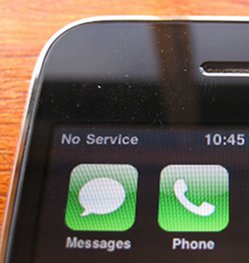Blog posts tagged business continuity
O2 mobile meltdown is a warning for your business
 If - like me - you're an O2 mobile user, you may well have found your phone strangely silent yesterday afternoon. From around 2pm, thousands of customers were unable to make or receive calls on the company's network.
If - like me - you're an O2 mobile user, you may well have found your phone strangely silent yesterday afternoon. From around 2pm, thousands of customers were unable to make or receive calls on the company's network.
As I write this the company says the problem is on the way to being fixed, but the resulting news stories and thousands of tweets don't make pretty reading for the telecoms giant.
In a world where we rely on mobile phones for, well, everything, it can come as quite a shock when the expensive one in your pocket is rendered useless for 18+ hours.
No calls. No texts. No emails. No tweets. No maps to guide you if you're in a strange place. No point in having the thing!
Your business, incommunicado
The consequences of this outage for business could be serious. If you're out and about, you can be rendered incommunicado. Companies which rely on homeworkers or have mobile sales teams are likely to have been particularly hard hit.
If customers and colleagues can't get hold of you, it holds things up. Decisions don't get made. Perhaps sales get missed.
If you've been affected by the outage, it's lousy. But it should be a wake-up call for all of us: sometimes, these things happen (they shouldn't, but they do). And that's why you need to be prepared.
Coping with mobile meltdown
The problem is, short of buying a second mobile phone on a different network for each member of staff, it's hard to put in place a failsafe backup for this sort of event. Even if everyone does have a second phone, it's no good unless people know its number!
However, here are three suggestions that can make it a little easier to stay in touch during a big mobile outage:
- Spread the risk. Instead of issuing all your staff with mobiles from the same provider, split them between two if it's practical. At least that way not everyone will be affected by a single-network problem. (Obviously this isn't always worthwhile, because your business will have to deal with two suppliers, two different support numbers and so on.)
- Adopt basic VoIP. If you don't already use VoIP in your business, make sure everyone with a smartphone has an app like Skype on it. This will at least allow your staff to make and receive calls when connected to a wireless network. It doesn't mean callers can reach you on your normal number, but at least you can place calls.
- Communicate the issues. Let people know you're experiencing communication problems in any way you can. Put a message on your website, mention it on your Twitter and Facebook pages, and be sure to mention it in emails to customers and clients during the outage.
More fundamentally, perhaps problems like this highlight the benefits of a unified communications system. That can give you just one number, which you can redirect to wherever required.
Has your business been hit by the O2 outage? Is your service back to normal yet? Leave a comment and let us know how you coped.
- VoIP explained
- How unified communications can help your business
- Your 20-minute business continuity plan
(Image: Flickr user sridgway under Creative Commons.)



